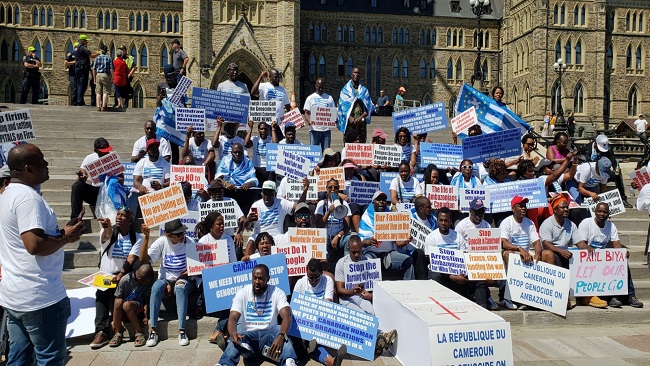Anglophone Crisis in Cameroon was Decades in the Making
The anglophone crisis in southwestern Cameroon is getting worse, and outside observers are beginning to notice. According to Amnesty International, “alarm bells are ringing” in Congress over Cameroon, and on July 31, Karen Pierce, the Permanent Representative of the United Kingdom to the United Nations, tweeted that there is “lots of interest” in the crisis among UN representatives in New York. Such interest will likely result in greater foreign involvement. External actors should recognize the current crisis was not inevitable, but rather the result of decades of concerted efforts by the regime in Yaoundé to marginalize the anglophone regions.
After allied forces captured “Kamerun” from Germany in World War I, the League of Nations divided the territory between the British and the French. Most of the territory became French Cameroun, while a strip bordering Nigeria became the British Cameroons. The British Cameroons, governed from—but not considered part of—Nigeria, were split into northern and southern administrative units. In 1960, francophone Cameroon and Nigeria became independent, prompting the UN to organize a plebiscite allowing anglophone Cameroonians to decide whether to integrate with Nigeria or Cameroon. Independence, the most favored outcome, was not an option. Northern Cameroons joined Nigeria, while Southern Cameroons opted for reunification with Cameroon.
The constitution of the newly-established Federal Republic of Cameroon guaranteed respect for the cultural identity of the anglophone regions. But, in 1966, President Ahmadou Ahidjo banned all political parties other than the ruling Cameroonian National Union (the ban has since been lifted). In May 1972, a national referendum approved a new constitution that replaced the government’s federal structure with a unitary system. The referendum, which government records claim 99.9 percent of voters supported with 98.2 percent turnout, went against a 1961 agreement that “proposals for revision [of the constitution] shall be adopted by simple majority vote of the members of the Federal Assembly, provided that such majority includes a majority of the representatives…of each of the Federated States.” In 1984, President Paul Biya renamed the country the Republic of Cameroon—the name it held prior to reunification in 1961—and changed the national flag from a two-star design, which had signified the union of the anglophone and francophone regions, to that of a single star.
Biya’s affront to the anglophone region proved the breaking point in relations with the central government. On March 20, 1985, Fon Gorji Dinka, an anglophone lawyer and the first president of the Cameroon Bar Association, denounced the government’s actions as unconstitutional and called for an independent anglophone entity known as the Republic of Ambazonia; Dinka was arrested and imprisoned for nearly a year without trial. Today, little has changed. Biya remains in power, the government represses the anglophone minority’s identity, and separatists long for an independent Ambazonia. However, after nearly a year of protests over the use of French in anglophone schools and courts, the “anglophone problem” erupted. In September 2017, the Ambazonia Defense Council declared war on the Cameroon government.
Both sides have been accused of war crimes and refuse to talk to each other. Separatists do not trust the government after it violated previous agreements, while Biya said that his “government is open to dialogue only as far as the unity and diversity of our country are not questioned.” This seems particularly tone deaf given the Yaoundé regime’s history of undermining the country’s “unity and diversity.” The United States has a number of tools at its disposal to encourage talks, such as making aid conditional upon prosecution of human rights abusers, as the Senate report on the Department of State, Foreign Operations, and Related Programs Appropriations Act, 2019 suggests. But if and when talks begin, outside mediators and negotiators should place today’s crisis in the context of Yaoundé’s historical approach to the anglophone minority.
Culled from Council on Foreign Relations





